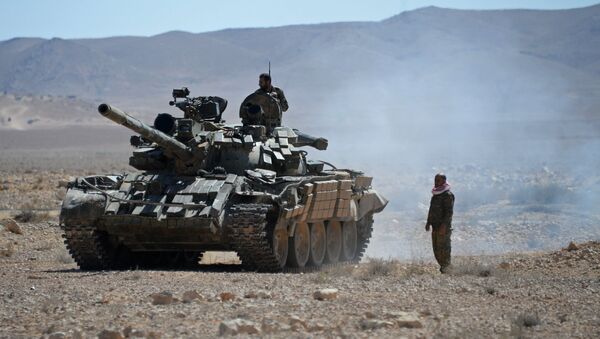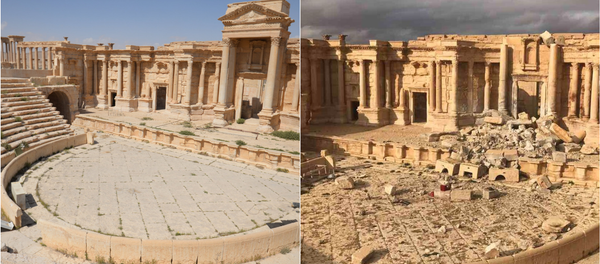"For the first time in four years, government forces have managed to reach the bank of the Euphrates River east of Khafsah. Fifteen kilometers of riverside is under their control," Col. Gen. Sergei Rudskoi, the chief of the Russian General Staff Main Operational Directorate, said.
He said the Syrian Army continues advancing east of Palmyra and extending the security zone to its north and south a week after liberating the city from terrorists.
"After taking control of the city of Palmyra, the Syrian government troops continue their offensive east of the city and, capturing dominant heights, extend the security zone to the north and south," Rudskoi said.
On March 2, the Syrian government forces regained control over Palmyra with the support of the Russian aircraft operating in Syria. The operation was carried out with minimal losses among the anti-terrorist troops.
The city was occupied by Daesh (banned in Russia) in May 2015 and was under control of the terrorists until March 2016, when the Syrian army supported by Russia's Aerospace Forces liberated it. However, the jihadists later succeeded to drive out the Syrian government forces in December 2016 after a large-scale offensive.
Nearly 200 Russian engineers and 32 pieces of equipment have arrived in Palmyra to begin mine clearance operations, according to the military official.
"The first unit of the Russian Armed Forces International Mine Action Center has arrived in Syria for mine clearance of liberated from terrorists Palmyra," Rudskoi said adding that the unit comprises 187 troops and 32 pieces of special equipment.
The Col. Gen. said "the regime of the cessation of hostilities introduced on December 30, 2016, continues to be maintained throughout Syria" and specified that "over the past week, agreements on the accession to reconciliation have been signed with officials from 47 settlements, whose total number has reached 1,338."
"The number of 'moderate opposition' units that declared their adherence to the cessation of hostilities has increased to 199," Rudskoi said.
Speaking about the situation in the eastern Aleppo province, the officer said that "a considerable success has been reached" and "over the past week, 92 settlements have been liberated from terrorists in an area of 479 square kilometers". He said the Syrian troops with the support of Russian aviation continued to fight Daesh.
"These successes became possible due to the activities of the Russian aircraft, which have conducted 452 strikes against Daesh targets in the eastern part of Aleppo province over a week. More than 600 militants have been killed, 16 infantry fighting vehicles, 41 pickup trucks armored with heavy machine guns… have been destroyed," Rudskoy said.
The civil war in Syria has been lasting for around six years with government troops fighting against numerous opposition factions and terror organizations such as al-Nusra Front and Daesh, outlawed in Russia.
Moscow has been conducting a counter-terrorist campaign in Syria since September 30, 2015, at President Bashar Assad's request.
Russian President Vladimir Putin announced in December that the Syrian government and armed opposition groups had reached an agreement on a nationwide ceasefire in Syria and on readiness to start peace talks.
Rudskoi added that the next round of Syrian peace talks in Astana will work on completing a single map of Daesh and al-Nusra Front terrorist groups' presence in the war-torn country.
"The meeting plans to complete a single map of al-Nusra Front and Daesh presence in Syria, agree on a project of a local reconciliation clause, form a working group on prisoner exchanges, discuss proposals to form an international coalition to clear UNESCO heritage sites of mines and create a constitutional commission," Rudskoi said during the briefing.
On Thursday, the Kazakh Foreign Ministry said the next Astana talks round would be held on March 14-15.
The previous round of Astana talks took place on February 15-16 and resulted in the agreement of the participants to set up a ceasefire monitoring group comprising Iran, Russia and Turkey, that would report to the United Nations.



